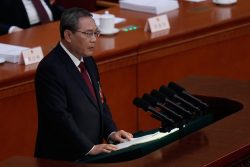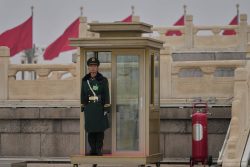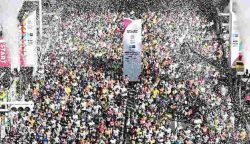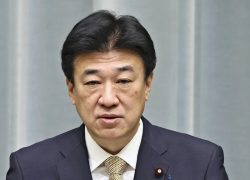Israel’s Netanyahu Goes to Hospital for Pacemaker. He says He will Push Ahead with Judicial Overhaul

Thousands of Israelis march along a highway towards Jerusalem in protest of plans by Prime Minister Benjamin Netanyahu’s government to overhaul the judicial system, near Abu Gosh, Israel, Saturday, July 22, 2023.
12:11 JST, July 23, 2023
JERUSALEM (AP) — Prime Minister Benjamin Netanyahu was rushed to the hospital early Sunday for an emergency procedure to implant a pacemaker, plunging the country into deeper turmoil after widespread protests overt his contentious judicial overhaul plan.
Netanyahu’s office said that he would be placed under sedation and that a top deputy, Justice Minister Yariv Levin, would stand in for him while he underwent the procedure. But in a brief video statement, Netanyahu also declared that he “feels excellent” and planned to push forward with his plan as soon as he was released. Levin is the mastermind of the overhaul.
Netanyahu’s announcement, issued well after midnight, came a week after he was hospitalized for what was described as dehydration. It also came after a tumultuous day that saw some of the largest protests to date against the judicial overhaul plan.
Hundreds of thousands of people took to the streets across Israel on Saturday night, while thousands marched into Jerusalem and camped out near the Knesset, or parliament, ahead of a vote expected Monday that would approve a key portion of the overhaul.
Further ratcheting up the pressure on the Israeli leader, over 100 retired security chiefs came out in favor of the growing ranks of military reservists who say they will stop reporting for duty if the plan is passed.
Netanyahu and his far-right allies announced the overhaul plan in January, days after taking office. They claim the plan is needed to curb what they say are the excessive powers of unelected judges. Critics say the plan will destroy the country’s system of checks and balances and put it on the path toward authoritarian rule. U.S. President Joe Biden has urged Netanyahu to halt the plan and seek a broad consensus.
Netanyahu, 73, keeps a busy schedule and his office says he is in good health. But over the years, it has released few details or medical records. On July 15, he was rushed to Israel’s Sheba Hospital with dizziness. He later said he had been out in the hot sun and had not drunk enough water.
His return to Sheba for the pacemaker procedure indicated his health troubles were more serious than initially indicated. In the video, Netanyahu said that he was outfitted with a monitor after last week’s hospitalization and that when an alarm beeped late Saturday, it meant he required a pacemaker right away.
“I feel excellent, but I listen to my doctors,” he said.
It was not immediately clear what the hospitalization meant for the judicial overhaul, which has bitterly divided the nation. Netanyahu said he expected to be released in time to go to the Knesset for Monday’s vote. In the meantime, his office said the weekly meeting of his Cabinet, usually held each Sunday morning, had been postponed.
A pacemaker is used when a patient’s heart beats too slowly, which can cause fainting spells, according to the National Institutes of Health. It can also be used to treat heart failure. By sending electrical pulses to the heart, the device keeps a person’s heartbeat at a normal rhythm. Patients with pacemakers often return to regular activities within a few days, according to NIH.
The procedure normally involves a doctor inserting the pacemaker near the collarbone, according to Mayo Clinic. A hospital stay of at least a day is usually required.
As Netanyahu spoke, thousands of Israelis camped out in Jerusalem’s main park, just a short walk from the Knesset, after completing a four-day march from Tel Aviv to rally opposition to the judicial overhaul. Late Saturday, hundreds of thousands of Israelis took to the streets in Tel Aviv and other cities in a last-ditch show of force hoping to head off the judicial overhaul.
In scorching heat that reached 33 C (91 F), the procession into Jerusalem turned the city’s main entrance into a sea of blue and white Israeli flags as marchers completed the last leg of a four-day, 70-kilometer (45-mile) trek from Tel Aviv.
The marchers, who grew from hundreds to thousands as the march progressed, were welcomed in Jerusalem by throngs of cheering protesters before they set up camp in rows of small white tents.
The proposed overhaul has drawn harsh criticism from business and medical leaders, and a fast-rising number of military reservists in key units have said they will stop reporting for duty if the plan passes, raising concern that Israel’s security could be threatened. An additional 10,000 reservists announced they were suspending duty Saturday night, according to “Brothers in Arms,” a protest group representing retired soldiers.
More than 100 top former security chiefs, including retired military commanders, police commissioners and heads of intelligence agencies, joined those calls on Saturday, signing a letter to Netanyahu accusing him of compromising Israel’s military and urging him to halt the legislation.
The signatories included Ehud Barak, a former Israeli prime minister, and Moshe Yaalon, a former army chief and defense minister. Both are political rivals of Netanyahu.
“The legislation is crushing those things shared by Israeli society, is tearing the people apart, disintegrating the IDF and inflicting fatal blows on Israel’s security,” the former officials wrote.
In his statement, Netanyahu said he would continue to seek a compromise with his opponents. He paused the plan in March after widespread demonstrations, but he revived it last month after compromise talks collapsed.
Israel Katz, a senior Cabinet minister from Netanyahu’s Likud party, said the bill would pass one way or another Monday and rejected the pressure from the ranks of the military, the most respected institution among Israel’s Jewish majority. “There is a clear attempt here to use military service to force the government to change policy,” he told Channel 12 TV.
The overhaul measure would limit the Supreme Court’s oversight powers by preventing judges from striking down government decisions on the basis that they are “unreasonable.”
Proponents say the current “reasonability” standard gives judges excessive powers over decision making by elected officials. Critics say removing the standard, which is invoked only in rare cases, would allow the government to pass arbitrary decisions, make improper appointments or firings and open the door to corruption.
Monday’s vote would mark the first major piece of legislation to be approved.
The overhaul also calls for other sweeping changes aimed at curbing the powers of the judiciary, from limiting the Supreme Court’s ability to challenge parliamentary decisions, to changing the way judges are selected.
Protesters, who come from a wide swath of Israeli society, see the overhaul as a power grab fueled by personal and political grievances of Netanyahu, who is on trial for corruption charges, and his partners, who want to deepen Israel’s control of the occupied West Bank and perpetuate controversial draft exemptions for ultra-Orthodox men.
Top Articles in News Services
-

Survey Shows False Election Info Perceived as True
-

Hong Kong Ex-Publisher Jimmy Lai’s Sentence Raises International Outcry as China Defends It
-

Japan’s Nikkei Stock Average Falls as US-Iran Tensions Unsettle Investors (UPDATE 1)
-

Japan’s Nikkei Stock Average Touches 58,000 as Yen, Jgbs Rally on Election Fallout (UPDATE 1)
-

Japan’s Nikkei Stock Average Rises on Tech Rally and Takaichi’s Spending Hopes (UPDATE 1)
JN ACCESS RANKING
-

Producer Behind Pop Group XG Arrested for Cocaine Possession
-

Japan PM Takaichi’s Cabinet Resigns en Masse
-

Man Infected with Measles Reportedly Dined at Restaurant in Tokyo Station
-

Israeli Ambassador to Japan Speaks about Japan’s Role in the Reconstruction of Gaza
-

Videos Plagiarized, Reposted with False Subtitles Claiming ‘Ryukyu Belongs to China’; Anti-China False Information Also Posted in Japan




























